Introduction
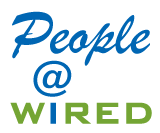 My involvement with WiRED International began with a strong-arm recruitment by my late father, Richard R. Gilbert, D.D., a guiding force in the organization’s early days nearly 30 years ago.
My involvement with WiRED International began with a strong-arm recruitment by my late father, Richard R. Gilbert, D.D., a guiding force in the organization’s early days nearly 30 years ago.
At first I edited a few web stories for WiRED. Gradually I took on more responsibility and used my professional background in copy editing and writing to contribute stories to WiRED’s website and then to support proposals and other materials. I became WiRED’s chief writer and managing editor of website content. Eventually, I happily joined WiRED’s Board of Directors in 2010.
WiRED’s Remarkable Evolution
I didn’t know much about WiRED at first, but I recognized it as an organization committed to global health and based on compassion, ingenuity and hard work.
But what struck me most was WiRED’s mission to educate people in low-resource communities to be responsible for their own health. WiRED wasn’t going to “fix” their poverty and disease for them. WiRED would provide cost-free community health training programs and delivery systems so that local graduates could work to elevate the health of their own communities.
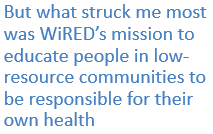 WiRED wasn’t planned — it sprang forth in 1997 from a Fulbright grant received by WiRED’s Executive Director Gary Selnow, Ph.D. While living in war-torn Croatia, he realized that technology could make a difference in the lives of isolated people. He began to connect people to the internet through setting up computers and computer centers, with some funding provided by USAID, an agency now eliminated by the Trump government.
WiRED wasn’t planned — it sprang forth in 1997 from a Fulbright grant received by WiRED’s Executive Director Gary Selnow, Ph.D. While living in war-torn Croatia, he realized that technology could make a difference in the lives of isolated people. He began to connect people to the internet through setting up computers and computer centers, with some funding provided by USAID, an agency now eliminated by the Trump government.
Ever since its birth, WiRED — a small all-volunteer organization with little budget — has survived for almost 30 years! How? By constantly adapting and innovating. WiRED has paired cutting edge technology with professionally written and peer-reviewed programs that work and which can rapidly meet a disease outbreak or an emerging disease.
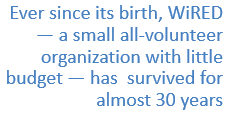 My favorite WiRED achievements:
My favorite WiRED achievements:
- When Ebola first struck Africa, WiRED produced the first, we believe, Ebola modules to offer both general audiences and healthcare professionals information on this frightening illness. Again, later on when mpox emerged, WiRED quickly rolled out an Mpox module. And WiRED just released a module to help HIV/AIDS victims now that treatment is gone.
- To reach isolated and remote populations along the Peruvian Amazon, WiRED — partnered with the Polus Center and Project Amazonas — traveled 15 hours on the river to establish community health facilities, lugging solar-powered equipment to run the computers there.
- When the World Health Organization called for community health worker (CHW) training, WiRED created an entire curriculum program with a continuing medical education component and used it to train CHWs in a pilot project in Kisumu, Kenya. WiRED managed to launch the test program there during the COVID-19 pandemic in 2020, and today that original paraprofessional team of only 20 serves more than 9,000 people a month!
- WiRED translates modules into many languages as needed from coronavirus modules in Mandarin, Spanish and Armenian to an entire health and first aid training in Ukrainian for the People of Ukraine.
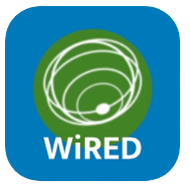 To supplement the breakthrough HealthMAP, WiRED created two new tools: an app for CHWs to upload WiRED’s programs onto Android and Apple phones and a continuing medical education tracker. WiRED can instantly distribute professionally developed health training programs to any country on earth. The programs, like all of WiRED’s efforts in low-income environments, are totally without cost.
To supplement the breakthrough HealthMAP, WiRED created two new tools: an app for CHWs to upload WiRED’s programs onto Android and Apple phones and a continuing medical education tracker. WiRED can instantly distribute professionally developed health training programs to any country on earth. The programs, like all of WiRED’s efforts in low-income environments, are totally without cost.
Conclusion and My Personal Ask
I marvel each time this tiny NGO launches a new project, makes an IT advancement or rapidly creates an urgently needed health module, and I am grateful to be part of the WiRED team.
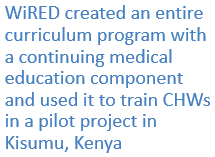 My father and mother believed that we should treat everyone with respect and equality and seize all opportunities to help others. My parents instilled in me a dedication to volunteerism, a stewardship that my husband and I have tried to pass on to our daughters and grandchildren.
My father and mother believed that we should treat everyone with respect and equality and seize all opportunities to help others. My parents instilled in me a dedication to volunteerism, a stewardship that my husband and I have tried to pass on to our daughters and grandchildren.
My volunteering for WiRED has given me a valuable insight into the suffering so many people endure daily outside my own comfortable life. I am honored to work with the WiRED Board and all the many WiRED volunteers, some of whom I only know through email exchange.
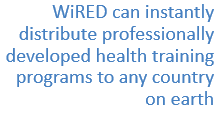 I have never traveled to the regions where WiRED serves. At one time in my life Africa was a vague image in my mind; now, through WiRED, I know well the faces of the CHWs in Kisumu, Kenya. When I read their testimonials I can clearly picture them testing people for tuberculosis or HIV/AIDS or examining a child for a respiratory illness during a health clinic or teaching classes on maternal and child health and clean water.
I have never traveled to the regions where WiRED serves. At one time in my life Africa was a vague image in my mind; now, through WiRED, I know well the faces of the CHWs in Kisumu, Kenya. When I read their testimonials I can clearly picture them testing people for tuberculosis or HIV/AIDS or examining a child for a respiratory illness during a health clinic or teaching classes on maternal and child health and clean water.
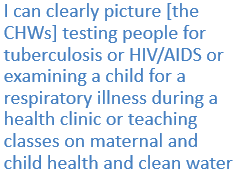 It states on the WiRED website: WiRED: Powered by Volunteers. National Volunteer Week is April 20–26. I urge everyone to volunteer for something you believe in, especially if such action affects the lives of others. Supporting WiRED is my way to do this. I hope it might be yours, too!
It states on the WiRED website: WiRED: Powered by Volunteers. National Volunteer Week is April 20–26. I urge everyone to volunteer for something you believe in, especially if such action affects the lives of others. Supporting WiRED is my way to do this. I hope it might be yours, too!
WiRED work is supported 95% by volunteers and operates as a family. We welcome and need your talents and enthusiasm, so anyone interested please email us at inquiry@wiredinternational.org and get involved!
![]() In today’s unsettled world, under-resourced communities are in crisis. Funding for programs such as USAID has been terminated by the Trump government. Consequently, I also ask you to consider a donation to WiRED today by clicking here.
In today’s unsettled world, under-resourced communities are in crisis. Funding for programs such as USAID has been terminated by the Trump government. Consequently, I also ask you to consider a donation to WiRED today by clicking here.
Earth Day is April 22
The first Earth Day took place in 1968. My school cancelled regular classes and ran workshops all day encouraging us teenagers to learn about how we could conserve our world for all living things. We were all so excited; it seemed so indisputable to want to save our planet through activism!
 In our current world, however, saving the planet has never been more urgent nor more difficult as nations argue and the science of climate change is often denied.
In our current world, however, saving the planet has never been more urgent nor more difficult as nations argue and the science of climate change is often denied.
Earth Day matters to WiRED. In fact, part of our mission is to incorporate the concept of One Health — that the balance of the world depends on the health of humans, animals and ecosystems — into WiRED health modules when appropriate. Further, WiRED has posted many articles and personal essays supporting One Health and explaining how accelerated climate phenomena such as flood and drought and their consequences of starvation and disease have affected underserved communities globally. Within the next month, WiRED will release an extensive One Health training program for teachers and students and CHWs.



